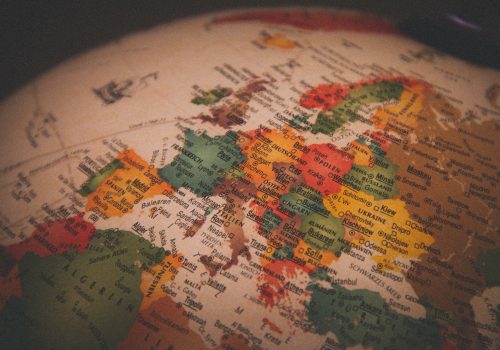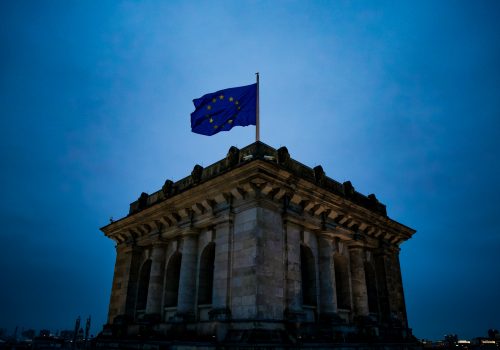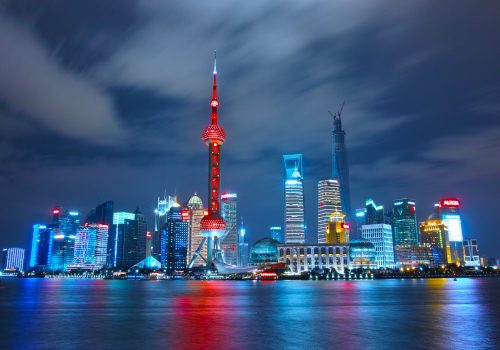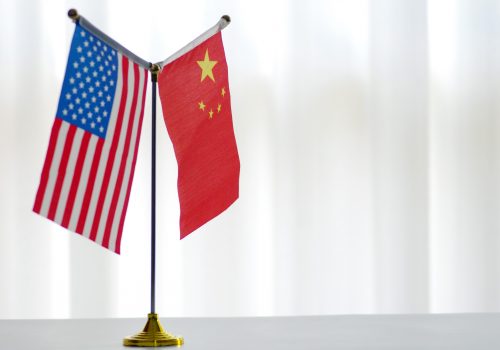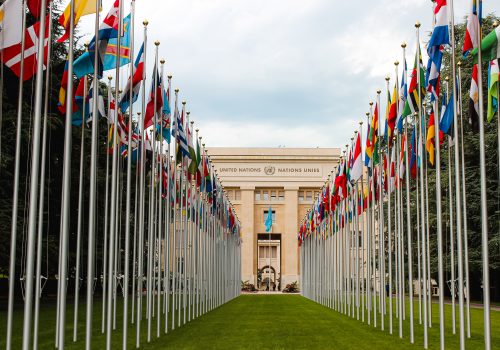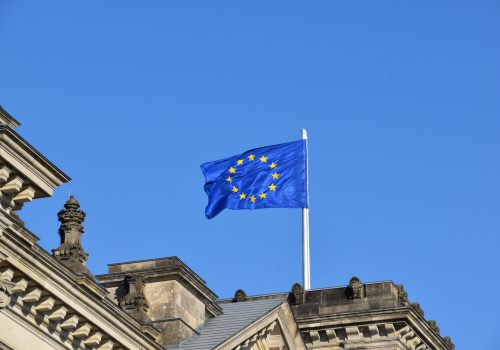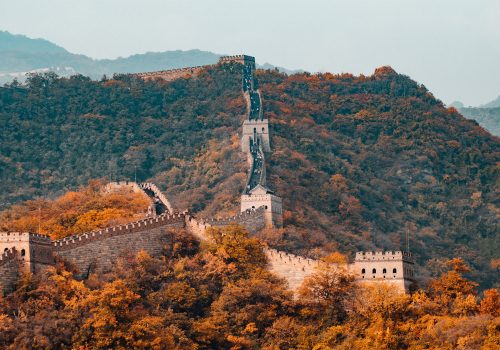Smart partnerships amid great power competition
Artificial intelligence (AI) and other emerging technologies are developing at an exponential pace, and the discussion about their use as well as their implications for society and international relations is shaped by uncertainty. Whether it is the future of work, the collection and application of data, or new means for surveillance and social manipulation—AI will most likely influence every aspect of modern life. Change is coming no matter whether people like it or not, and decision makers are under pressure to prepare for a new world in the digital age.
In order to establish forums, enable discussions about opportunities and challenges of modern technologies, and evaluate their implications for US-China relations, the Atlantic Council was awarded a Rockefeller Foundation grant that helped lay the groundwork for a new GeoTech Center, launched on March 11, 2020. Over the course of one year, we organized meetings in Paris, Brussels, and Berlin; traveled to Beijing and Shanghai; and held virtual conferences with India and Africa, all the while trying to answer one question: How can countries successfully collaborate on big data, AI, and other modern technologies amid the widening political gyre?
AI, China and the global quest for digital sovereignty
The following report captures key takeaways from these roundtable conversations, identifies the challenges and opportunities that different regions of the world face when dealing with emerging technologies, and evaluates China’s role as a global citizen. In times of economic decoupling and rising geopolitical bipolarity, it highlights opportunities for smart partnerships, describes how data and AI applications can be harnessed for good, and develops scenarios on where an AI-powered world might be headed. Given the experimental nature of emerging technologies, it will come as no surprise that the emphasis is thereby put on the need for regulatory cooperation, even as we recognize that AI development has become a new playing field for great power competition.
As a matter of fact, during the conversations, it often seemed as if the political winds have changed so dramatically that America’s win-win approach towards China and international cooperation has turned into a lose-lose situation, with globalization being the prime casualty, as Ed Luce wrote so eloquently in the Financial Times about the Paris meeting last year. In worrying about the growing Sino-US rivalry and being reluctant about picking sides, countries and state conglomerates around the world have started to pursue their own digital sovereignty.
Yet optimism prevails in many places. Throughout all of the workshops, there was universal agreement that AI and other emerging technologies are critical for social progress. While advanced economies may have seen the greatest gains so far from integrating modern technologies, poorer societies won’t be able to leapfrog into much more advanced stages of development without using them. Within societies, no ethnic, racial, or minority group should be disadvantaged, and ideally, new tech should be a tool for reducing class divisions instead of intensifying them. Paving the way for such an uplifting process, cooperation within and among countries at a global, national, and sub-national level is necessary. Despite everyone allegedly sharing the same positive goals and principles, international cooperation on mutually agreed regulatory AI-frameworks remains unlikely, not least because the global governance system is under immense pressure.
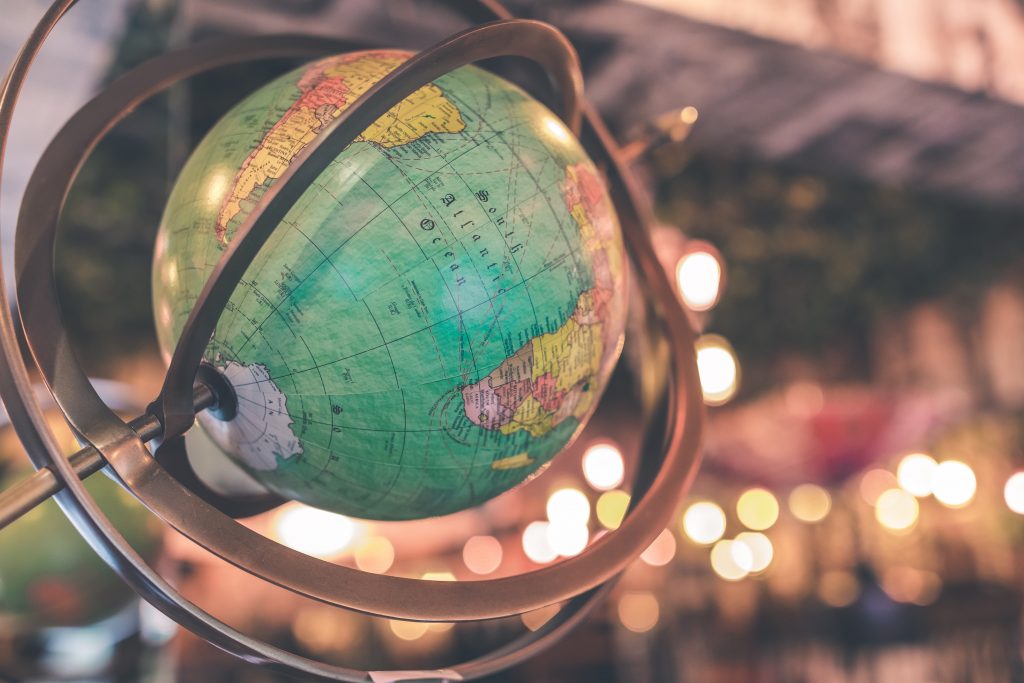
A broken global order
Skepticism and distrust in emerging technologies are both a cause and an effect of a world in disarray. Popular hostility in the United States towards China has grown significantly, with influential voices citing Beijing’s use of intellectual property (IP) theft or forced handover of technology from US companies as the means by which the People’s Republic of China (PRC) has caught up with the West. Furthermore, many decision makers in Washington believe that China’s rapid progress threatens the United States’ traditional leadership role. Resentment that is partly fueled by the fact that globalization and China’s growing economic role has coincided with a decline of American middle-class living standards and a public fatigue with the US’ global engagement.
On the other hand, Chinese interlocutors hold the opinion that the United States is using the allegations to push down China and deny the country its rightful place in the world. At the Berlin workshop, one Chinese expert explained that decision makers in Beijing, as well as many in the public, never refer to the “rise” of China, but rather see it as a “restoration.” Metaphorically speaking, the PRC might have been able to play at the high table, but it has always been reminded who owns the casino. From Beijing’s perspective, however, China deserves to be a rule maker, not just a rule taker.
Even though the East Asian country is not close to eclipsing US dominance yet, any sort of cooperation is difficult to implement as long as the legitimacy of China’s rise is in dispute in Washington and other Western capitals. Ideological questions as well as different narratives further complicate the situation. Beijing sees AI and other emerging technologies primarily as a critical tool for preserving domestic stability and improving its defense capabilities, while US decision makers feel increasingly pressured to get tough on Beijing “before it is too late.” US State Department officials at the Paris meeting, for instance, explained that as long as China remains undemocratic and expands its authoritarian control, the United States won’t pursue any kind of cooperation on AI and other emerging technologies. Furthermore, they called on other democratic countries in Europe not to engage with China on tech either—leaving European participants not just in disbelief but in fear of a great power competition that can easily spiral out of control.
Despite the subsequent Sino-US trade talks and settlements, tensions over AI and other emerging technologies have grown worse over the course of last year—particularly in light of the ongoing COVID-19 pandemic. In response to the PRC’s decision to impose a national security law on a semi-autonomous Hong Kong, the Trump administration announced retaliatory measures, including the restrictions on Chinese students and researchers to study certain disciplines at American universities. Furthermore, the United States has been battling Huawei, China’s telecommunication heavyweight, and continues to threaten friends and foes alike with countermeasures if they allow Chinese tech firms help build respective 5G networks. Beyond the restrictions on Huawei, the Trump administration has outright banned some Chinese companies to operate in the US market.
Unsurprisingly, China’s current and former high-ranking officials strongly object the US position and, at various roundtables, pointed to America’s “imperfect record on human rights” as well as ongoing “illegal interferences” in other countries’ domestic affairs, including China. As a matter of fact, most Chinese officials we talked to stressed that they did not favor economic decoupling with the United States and the West, even though some in the circles of Chinese decision making allegedly welcome the decoupling efforts, as it helps Beijing to identify the weaknesses in their domestic systems and the need for remedial action.
The full text of this report is split across a collection of articles to give readers the opportunity to browse in any order.
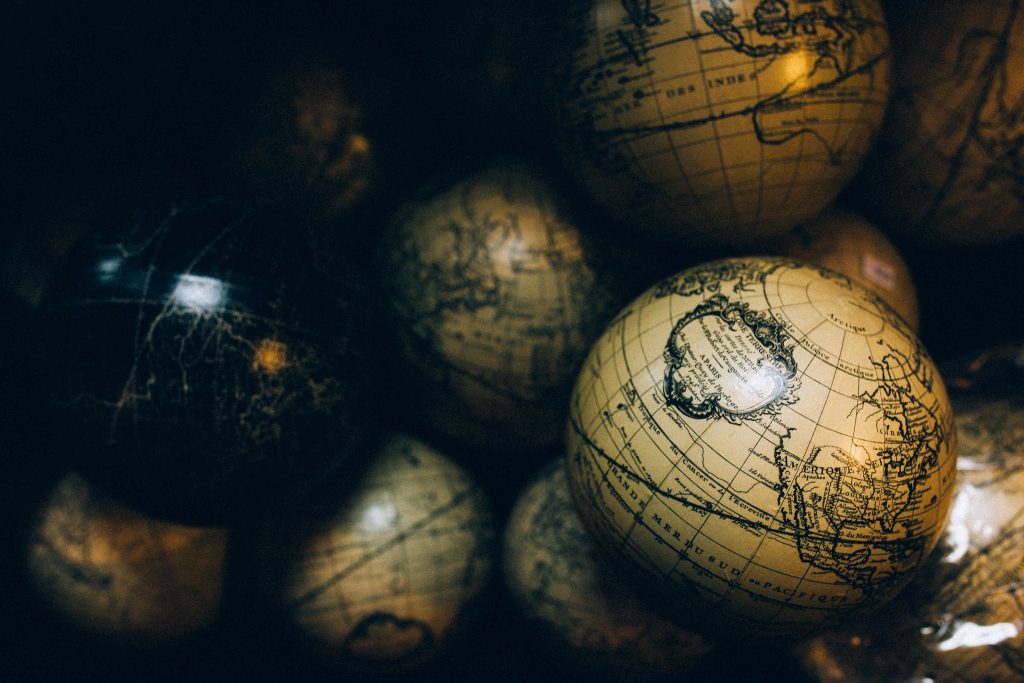
Scenarios for a future tech world
Decision makers, non-government actors, and private companies are constantly being tasked with anticipating the next crisis and exploiting future opportunities, which is why scenario analysis can be a key tool. It helps those involved think through possible futures and the respective policies that help shift trajectories one way or the other. Based on the key trends, observed by the discussion groups and highlighted in this report, the following three scenarios discuss different futures; distinguish between the good, the bad, and the ugly; and help us think about what lies ahead.
The full text of this report is split across a collection of articles to give readers the opportunity to browse in any order.
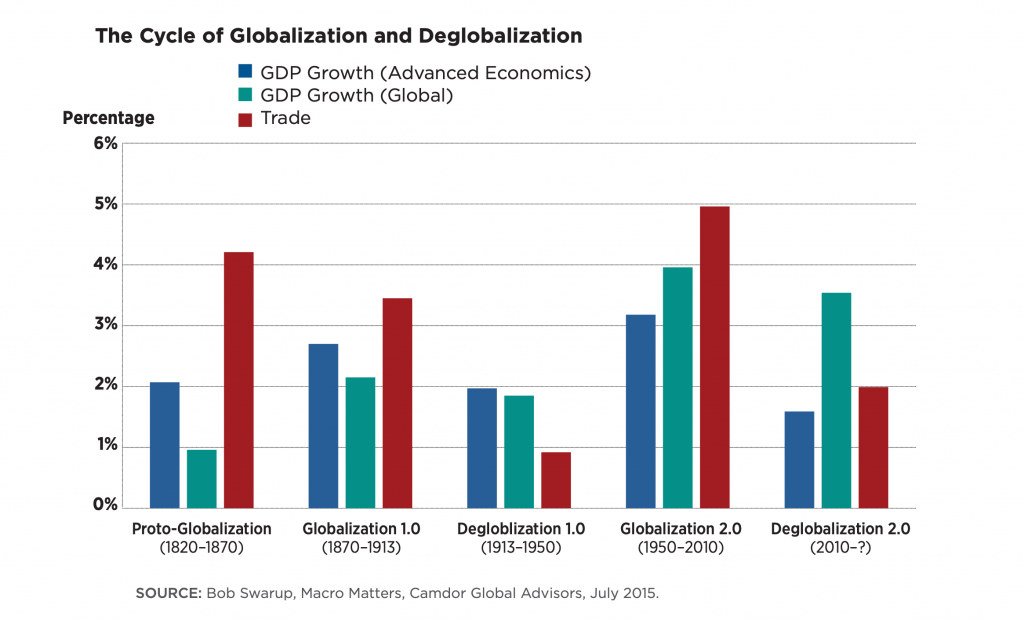
A justified worry
One would think that the magnitude of potential disruptions for society and the speed at which modern technologies are developing incentivizes governments to cooperate, somehow trying to mitigate negative externalities, maximize opportunities, and achieve a multilateral resurgence. However, reality appears to be moving towards quite the opposite and roundtable participants warned of a new Cold War on tech. With tensions rising and collaborative efforts declining, the world is headed toward geopolitical bipolarity and conflict might only be a question of time. In a globalized world where economies have become intertwined, decoupling efforts will not only be painful for businesses, particularly in export-oriented countries, they will also hamper the benefits of scientific exchange—putting decades of progress at risk.
Businesses, philanthropies, or other non-government actors might want to step in and lead the way toward technological cooperation, but braving political storms at the same time will be a difficult endeavor. Particularly concerning is the potential ideologization as well as securitization of the debate. Once decision makers see the tech issue primarily through lenses of national security and political supremacy, any sort of collaboration will be much harder to incentivize, let alone implement. Though time is running out—AI and other emerging technologies are developing at an exponential pace. Many interlocutors worried that it might take a catastrophe for humanity to realize the potentially disruptive effects and see the need for international regulation. The future, of course, is uncertain and foresight remains an art rather than a science, but building smart partnerships might help navigate global challenges and lay the groundwork for a multilateral resurgence, so that technologies can be a force for good, help societies progress, and lead the world toward a better future.
Interested in learning more about the individual roundtables in Europe, China, India, and Africa? Below are the recaps of each of those meetings with their respective analysis.
Roundtable series on AI, China, and smart partnerships for global challenges
About the authors

Image: GeoTech's Smart Partnerships report, image of a chessboard
